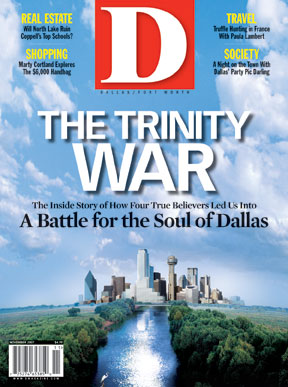it is 8 o’clock on a tuesday night. i should be home, fighting with my wife over the phone bill. Instead I’m standing at the back of a packed auditorium in an Oak Cliff elementary school, watching Mayor Tom Leppert stammer out an answer to a question from Councilwoman Angela Hunt, wondering how dorky I look for taking pictures of the proceedings with my iPhone. “It’s for the blog,” I want to whisper to those nearby. But, of course, the only possible dorkier defense would involve a 20-sided die.
Then it hits me. Maybe it’s the overcooked auditorium bringing me to a moment of clarity, like an Indian sweat lodge. But I finally see the simplest way to understand the Trinity toll road referendum.
Tom Leppert is scared. He fears for his political fortunes should he lose this debate. But he also fears—genuinely—for the city’s future. If the other side wins, if the road as it’s now drawn gets killed, he fears the entire Trinity Project will evaporate. The politicians will lose their stomach for the fight, the funding will dry up, the plan will die. The opportunity of a lifetime will have been squandered.
He doesn’t know that will happen. No one—including Angela Hunt—knows what will happen if the referendum passes. But that is Leppert’s fear.
Now, Hunt? She’s scared, too. If her referendum fails, she should ask the city secretary to return those 52,000 certified petitions, because it’s going to be a cold winter in the Hunt household. She can use them for kindling.
But she also fears—again, genuinely—for the city’s future. If the other side wins, if a big road runs through it, she fears the park will be a disaster. The cars and the concrete will wreck it. And when the Trinity River does flood, it’ll be a Katrina-style catastrophe.
She doesn’t know that will happen. But that is Hunt’s fear.
And this fear, on both sides, has led to some stupid maneuvers. Like Leppert trotting out images of trees planted on the levee, which the Army Corps of Engineers doesn’t normally allow. So Hunt seizes on those trees and tries to use them to show that the entire project is a lie. And then Leppert says we can put the trees in pots, which is ridiculous.
I’m watching this happen at the Oak Cliff debate, and I’m thinking: who cares about trees on the levee? We don’t need them. The important consideration is trees between the road and the park, to insulate the kayakers and joggers against the sight and sound of all those cars. We can plant as many trees as we like there.
If you refuse to be scared, if you think about it clearly, the entire project makes sense. To my mind, an enormous urban park—already crisscrossed with bridges, set on the edge of a bustling downtown business district—won’t be ruined by a toll road. It’s a mammoth undertaking. I expect its cost will grow. But to steal a reference from a recent Chicago transplant who compared this project to Millennium Park, the great architect Daniel Burnham said: “Make no little plans. They have no magic to stir men’s blood and probably themselves will not be realized.”
On November 6, I will vote yes for the road—or, I mean, I’ll vote no to not having the road. Oh, boy. Now I am scared.
Write to [email protected].





